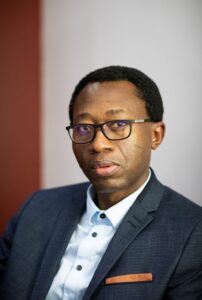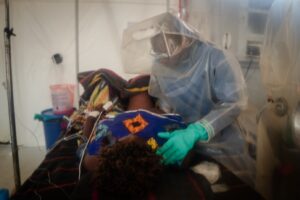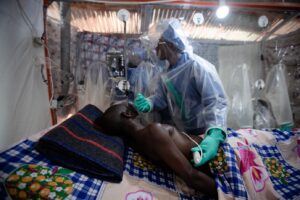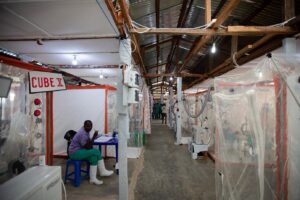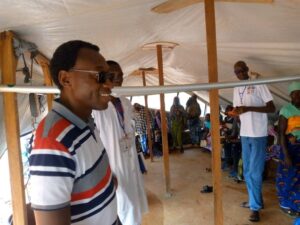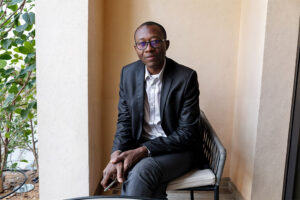Richard Kayembé Kojan was born in Lubumbashi, in the south-east of former Zaire, now the Democratic Republic of the Congo (DRC). He could have had a comfortable and carefree life but chose instead to devote himself entirely to the most vulnerable. A brilliant scholar, after completing his studies at the Faculty of Medicine at the University of Kinshasa, Richard worked at the university clinic, treating his former teachers, their families, and the upper-class bourgeoisie of the capital city of the DRC. Tired of caring for the privileged and driven by the desire to help those who couldn’t afford the costs of a hospital stay, he accepted a six-week internship in the province of Kongo Central. For the first time in his life, he was confronted with the rural reality of this underdeveloped country. That experience changed him forever.
“For me, it is not acceptable to have a double standard, a different one between patients in teaching hospitals in big cities and patients in rural village hospitals. Patients are equal and deserve the same standard of care.”
Just as Richard was starting to realize that his place was not in Kinshasa, he was approached by the medical team from Médecins Sans Frontières (MSF) who offered him to join a mission to North Kivu, in the east of the DRC. A former war zone, the situation there remained extremely volatile and could blow up at any time. But once Richard got there, he was there to stay. Every time the MSF evacuated its staff when they felt they couldn’t guarantee the team’s safety, he stayed behind. No question of leaving – it would have been a betrayal of the promise he gave himself.
“Leaving my mission would make no sense. Emergency ICU doctors are becoming more and more essential to the MSF. They supervise the surgical procedures, treat people with gunshot wounds, pregnant women in distress, children in a coma. On site, the care services were not structured. I was responsible for structuring them, resuscitating children with malaria.”
The word spread quickly, and soon the whole community spoke of a Congolese doctor “bringing people back from the dead.” In total, Doctor Kayembé Kojan spent ten years with the MSF. From 2006 to 2011, he operated out of Rutshuru, a small town located in North Kivu, near the Rwandan border. Each time the MSF evacuated its personnel, he stayed there – alone.
“We are talking about a region, which has suffered through all kinds of wars. It is marked by extreme violence. According to some American researchers, more than 10 million died because of the conflict,” says the doctor. He remembers a dark night when about thirty women were due to give birth at the maternity ward; suddenly hundreds of wounded flocked to the hospital: “In 48 hours, I did 15 C-sections and treated another 118 patients. All went well”. No patient died that night.
Another time he had two patients left in an extremely bad condition by a bombing: one was a Colonel of the Congolese Army and the other one was a Spanish nun. Suddenly, their hearts stopped beating. “The whole community was gathered at the hospital, I was in between. What to do? The two camps begged me to save them both: the one who protects them, the one who helps them.” So, he did the impossible and revived them both at the same time. “I put the colonel on a machine, and I revived the nun manually; both survived.”
Dr. Kojan’s contributions have advanced healthcare standards for challenging environments. He helped whoever needed help, and the government didn’t always like his activity. In 2011, when Doctor Kayembé Kojan landed at the Lubumbashi Airport, he was arrested and subjected to a tough interrogation by members of the intelligence services. “They knew everything about my work: the names of the patients, the dates of the operations. I told them that I was caring for the wounded regardless of their ethnicity or whether they belonged to rebel groups. I am a doctor, I treat everyone.”
However, fearing for his family’s safety, he moved them to Johannesburg, South Africa, and then relocated to Dakar for work. Upon becoming ALIMA President, he also began spending time in Paris, traveling between Dakar and Paris for board and governance activities at ALIMA’s headquarters. The remainder of his time was spent in the field across various conflict zones, where he continued to care for numerous vulnerable patients.
In 2015, Doctor Kayembé Kojan went to Guinea when the West Africa was hit hard by the Ebola pandemic. The treatment protocols set up by the WHO meant that he couldn’t get close enough to his patients to help them, and that was very frustrating.
“I said to myself: “Either I give up medicine and change jobs, or I find a solution!” Together with the ALIMA team, we developed the CUBE, a bio-secure emergency room to better treat the epidemic without being infected. Thanks to this device, I can spend all the time necessary to monitor the patient next to them. We can bring all the much-needed equipment to the rural areas and make it available to the poor.”
For this achievement, he received the Game Changing Innovator Award in Abu Dhabi in November 2019. In the DRC, for instance, the CUBE has made it possible for pregnant women with Ebola to deliver safely, both naturally and via cesarean section.
With ALIMA, Doctor Kayembé Kojan travels a lot to fight diseases in Nigeria, in Burkina-Faso, in Haiti – at the request of the authorities to treat cholera patients. He tries to be as close as possible to the most vulnerable. Thanks to the new technologies that make his job easier, he intends to turn the page on old approaches to humanitarian work to end discrimination between patients in urban and rural areas.
The information on this page was last updated on 11/05/2024 and was provided by the Luminary.
